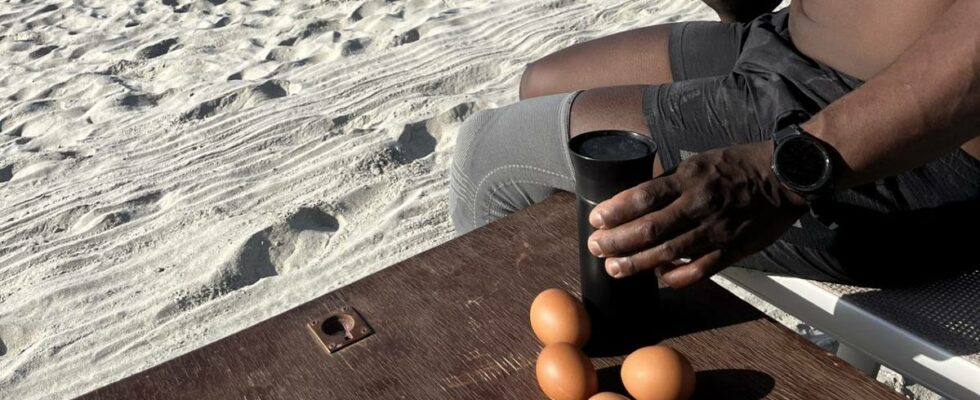– My husband reserves space for eggs in the suitcase. There must be space for at least two trays. Tone Steinsland’s family is probably above average interested in eggs. She is the general manager of the hatchery company Steinsland og co., where her husband Nash Mapfumba is also the hatchery and finance manager. And when the family goes on holiday abroad, it is of course not without Norwegian eggs in the luggage. – He packs eggs with him because he likes to eat them raw. He swears that eggs are the quickest source of the nutrients you need. Tone Steinsland manages, unlike her husband and her father, to let soft-boiled eggs from Jæren wait until after the holiday trip. Photo: Ole Andreas Bø All she needs is an egg carton and some tape Although her husband has been taking Norwegian eggs abroad for over ten years, this is something Steinsland has been used to for much longer than that. She grew up with a father who did the same. – He had to have soft-boiled eggs. There is a certain risk in eating soft-boiled, foreign eggs. There are few eggs that have the guarantee that Norwegian eggs have, so it is something we should be proud of, and not take for granted, says Steinsland. She does not have figures on how many countries the family has traveled to with Norwegian eggs in their luggage. Only Australia with its strict import rules has stood in the way of the egg tradition. With the exception of a couple of broken eggs once, the travels have gone well. Steinsland explains that all that is needed are egg cartons and some tape. She herself prefers to wait until they return home before enjoying her soft-boiled eggs. – Some look forward to coming home to fresh air and a duvet, while I look forward to coming home to soft-boiled eggs. I’ve stayed away from it down here, and rather look forward to eating eggs at home, says the egg farmer on the phone from Italy. It is more common for eggs in countries outside the Nordic countries to contain salmonella. Mapfumba therefore chooses eggs from the farm at home in Jæren. Photo: Ole Andreas Bø You should be careful about what you eat and drink According to Lindis Folkvord, section head for biological food safety in the Norwegian Food Safety Authority, it should not be necessary to take Norwegian eggs with you on holiday. There are, however, general precautions that it is good to be aware of. – Eggs from Sweden, Finland and Denmark have the same strict salmonella requirements as Norway. It should therefore be safe to eat soft-boiled eggs from these countries. We advise that eggs outside the Nordic countries should be heat-treated well before eating. – Salmonella is killed by boiling and frying. Read the general advice from the Norwegian Food Safety Authority: news Drinking water abroad Before drinking tap water abroad, you should check whether it is recommended to drink water directly from the tap, or whether it is safer to buy bottled water. If you don’t have access to bottled water, should you boil the water before drinking it NTB Banana or apple? Feel free to choose fruit that you can peel yourself, such as banana or oranges, rather than fruit that is usually eaten with the peel. Unknown Hot or cold? When heated to temperatures above 70 degrees for several minutes, the vast majority of bacteria are killed, so the most important thing you can do to avoid food poisoning is to ensure that the food is sufficiently heat-treated. Rule number one to remember: Keep hot food hot and cold food cold. Store food for as short a time as possible outside the fridge or cool bag. Illustration photo Wash your hands! Ensure good hand hygiene. Wash your hands well after using the toilet, contact with animals and when preparing food. Colourbox Common causes of food poisoning Insufficient heating Delayed cooling Storage at too high a cooling temperature That heat-treated food is contaminated by raw meat Sloppy cleaning Published 23.07.2024, at 21.42
ttn-69
The family at Jæren takes Norwegian eggs on a trip to the south – news Rogaland – Local news, TV and radio

